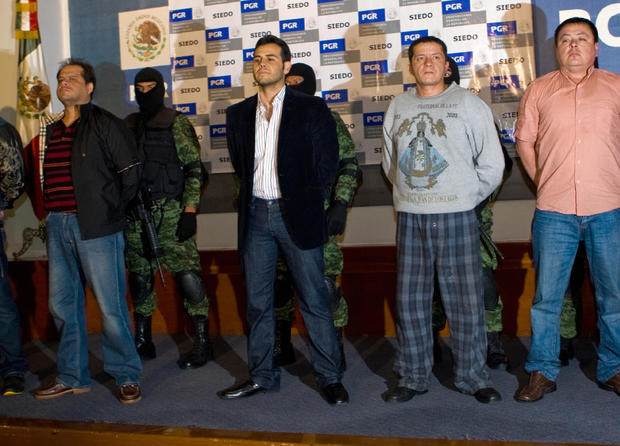Report: U.S. infiltrating Mexican drug cartels
U.S. law enforcement agencies are increasing their network of Mexican informants, expanding their ability to infiltrate drug cartels south of the border, according to a New York Times report
The paper, citing security officials, is reporting informants have already helped Mexican authorities capture or kill about two dozen drug traffickers.
Officials told the Times that over the last two years, Drug Enforcement Administration agents developed several "highly-placed confidential sources" with access to the "command and control" ranks of the Gulf Cartel and Los Zetas.
One of the paid informants, authorities say, was approached last spring by Mansour Arbabsiar, who is now charged in an alleged plot to assassinate the Saudi Ambassador. Arbabsiar reportedly reached out to him as to whether Los Zetas would be willing to engage in terrorist attacks in the U.S.
The network of informants has reported several of the country's major drug cartels have been broken down into smaller crime gangs, but the violence has not been stopped.
The Times' Ginger Thompson and Charlie Savage write that as America has expanded its role in criminal investigations beyond the U.S. border (including flying drones in Mexican air space), Mexican officials have reduced their resistance to American involvement.
"The Mexicans sort of roll their eyes and say we know it's happening, even though it's not supposed to be happening," security expert Eric Olson of the Woodrow Wilson Center told the paper.
Much about the U.S.' clandestine ties to criminal informants is secret from Mexican officials, out of fear that corrupt elements in Mexican law enforcement and government would jeopardize the operations.
Among the targets tracked by cartel informants are several suspects tied to the February 2011 murder of a U.S. Immigration and Customs Enforcement agent, Jaime Zapata. He was allegedly killed by members of the Los Zetas.
Ethical issues naturally arise when dealing with informants, many of whom are recruited by law enforcement officers to mitigate their own legal troubles.
Or they may be a smokescreen: In El Paso last month a mid-level leader of the Sinaloa cartel was found guilty on drug and conspiracy charges and sentenced to life in prison. He was accused of working as a double agent, providing ICE with information about a rival cartel in order to divert attention from his own trafficking operations.
A former senior counternarcotics official who spoke anonymously to the Times said the DEA's job is, first and foremost, to get inside the criminal organizations being investigated: "Nothing provides that microscopic view more than a host that opens the door."
To read more of the Times article click here.
